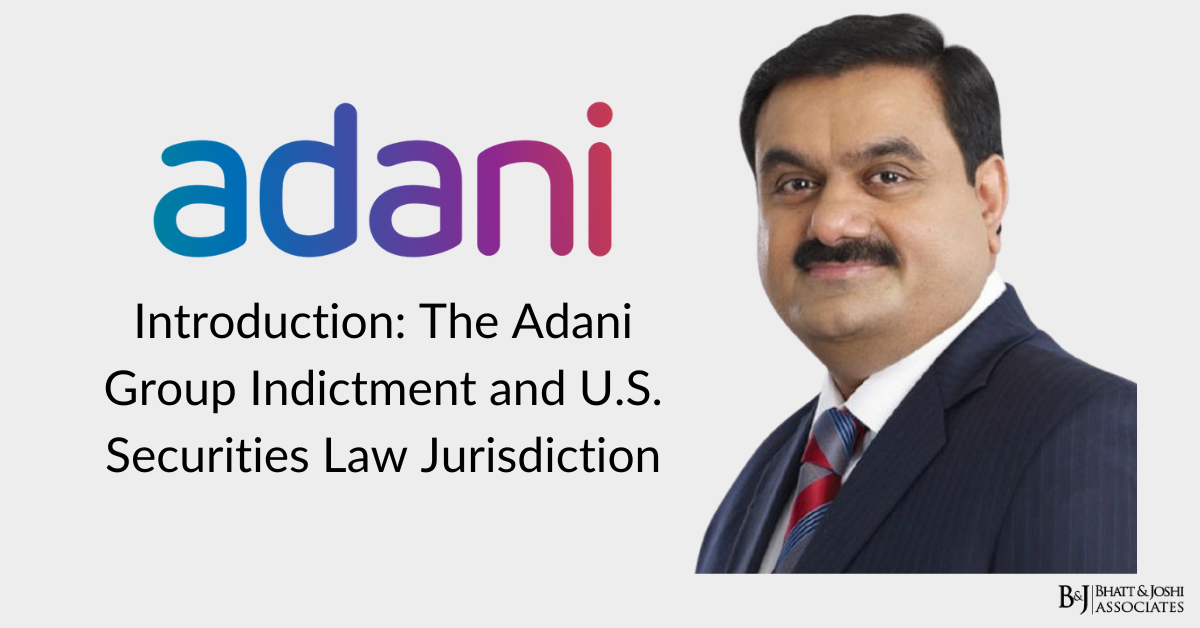The Adani Group Indictment Case: A Landmark Case Study in Cross-Border Securities Regulation and Corporate Governance
Chapter 1: Introduction: The Adani Group Indictment and U.S. Securities Law Jurisdiction

Background of the Adani Group Indictment Case
The unprecedented legal confrontation between the United States Securities and Exchange Commission (SEC) and the Adani Group represents a pivotal moment in the broader The Adani group indictment case, highlighting significant challenges to the extraterritorial reach of U.S. securities laws in recent history. The case, which emerged in late 2023, has drawn international attention not only for its scale but also for its potential to reshape the landscape of cross-border securities regulation. At its core, this legal battle involves one of India’s largest conglomerates, led by businessman Gautam Adani, whose corporate empire spans energy, infrastructure, and numerous other sectors critical to India’s economic growth.
The SEC’s enforcement action, filed under Section 10(b) of the Securities Exchange Act of 1934 and Rule 10b-5 thereunder, alleges a complex pattern of securities violations that traverses international boundaries. The parallel criminal indictment by the Department of Justice (DOJ) adds another layer of complexity to the case, charging multiple defendants under various federal statutes including the Foreign Corrupt Practices Act of 1977 (FCPA). The DOJ’s five-count indictment, unsealed in the United States District Court for the Eastern District of New York, details allegations of a sophisticated $265 million bribery scheme designed to secure solar energy contracts in India.
The enforcement action derives its authority from multiple statutory provisions, most notably Section 21(d) of the Securities Exchange Act, which grants the SEC broad powers to pursue civil enforcement actions. The jurisdictional foundation rests on both the Securities Act of 1933’s Section 22(a) and the Exchange Act’s Section 27, provisions that establish federal court jurisdiction over securities violations. These statutory frameworks become particularly significant when applied to foreign entities and individuals, as they test the boundaries of U.S. regulatory authority in an increasingly interconnected global financial system.
The case presents unique challenges in terms of evidence gathering and jurisdictional assertions. The SEC’s complaint alleges that the defendants engaged in a pattern of conduct that, while primarily occurring in India, had substantial effects on U.S. markets and investors. This connection to U.S. markets serves as the foundational basis for asserting jurisdiction, though this assertion itself raises complex questions about the limits of extraterritorial application of U.S. laws.
Significance for International Business and Law
The adani group indictment case transcends ordinary regulatory enforcement actions, embodying fundamental questions about the reach and limits of U.S. law in an era of global financial integration. Its significance manifests across multiple dimensions, each carrying profound implications for international business practices and legal frameworks.
From a jurisdictional perspective, the case directly engages with precedents established by the Supreme Court in Morrison v. National Australia Bank Ltd., 561 U.S. 247 (2010). The Morrison decision fundamentally altered the landscape of extraterritorial securities law enforcement by establishing the “transactional test,” which requires that alleged fraudulent activities involve either securities listed on U.S. exchanges or domestic transactions in other securities. The Adani case pushes the boundaries of this test, particularly regarding what constitutes a “domestic transaction” under Section 10(b).
The regulatory framework surrounding the case intersects with several major pieces of legislation enacted in response to various financial crises and corporate scandals. The Dodd-Frank Wall Street Reform and Consumer Protection Act of 2010, particularly Section 929P(b), granted the SEC enhanced authority over certain extraterritorial conduct. This provision specifically addresses the SEC’s enforcement powers in cases involving significant steps or substantial effects in the United States, directly impacting the theoretical foundation of the Adani prosecution.
International compliance standards play a crucial role in the case’s significance. The Sarbanes-Oxley Act of 2002, with its stringent requirements under Sections 404 and 302, mandates specific internal control assessments and executive certifications. These obligations extend to foreign private issuers trading on U.S. exchanges, creating a complex web of compliance requirements that affects corporate governance practices globally.
The case also highlights the intricate relationship between different international regulatory regimes. The interaction between U.S. securities laws and Indian corporate governance requirements creates a complex regulatory environment that multinational corporations must navigate. This intersection of regulatory frameworks raises important questions about regulatory cooperation, enforcement coordination, and the potential for conflicting legal obligations.
Research Objectives
The research objectives of this analysis extend across several interconnected domains, each crucial to understanding the full implications of the Adani case for international securities regulation and enforcement.
The primary objective involves a comprehensive examination of the jurisdictional basis for U.S. regulatory authority over predominantly foreign conduct. This includes detailed analysis of the Exchange Act’s Section 30(b) regarding foreign securities transactions and the FCPA’s jurisdictional provisions (15 U.S.C. §§ 78dd-1 through 78dd-3). The research explores how these provisions interact with international law principles and sovereignty considerations.
Another critical objective focuses on the procedural mechanisms employed in cross-border enforcement actions. This includes examination of international judicial assistance under 28 U.S.C. § 1781, the operation of mutual legal assistance treaties (MLATs), and the practical challenges of serving process on foreign entities under Federal Rules of Criminal Procedure Rule 4(c)(3)(C). The analysis considers how these procedural frameworks facilitate or hinder effective international enforcement efforts.
The study also evaluates potential defense strategies available to foreign entities and individuals facing U.S. enforcement actions. This encompasses constitutional challenges under the Due Process Clause, jurisdictional defenses based on the Foreign Sovereign Immunities Act, and various procedural objections under Federal Rules of Civil Procedure Rule 12(b). The research examines how these defensive tools operate in the context of international enforcement actions and their effectiveness in protecting legitimate business interests.
A comparative legal analysis forms another crucial objective, examining the interface between U.S. and Indian legal frameworks. This includes detailed consideration of how the Securities and Exchange Board of India Act, 1992, interacts with U.S. securities laws, and how Indian corporate law (Companies Act, 2013) relates to U.S. corporate governance requirements. The analysis extends to anti-corruption legislation, comparing the Indian Prevention of Corruption Act, 1988, with the FCPA’s requirements and enforcement mechanisms.
The research also assesses broader policy implications, including the impact on international securities markets regulation, effects on cross-border investment flows, influence on corporate governance standards in emerging markets, and the development of international regulatory cooperation frameworks. This policy analysis considers how the outcome of the Adani case might influence future regulatory approaches and corporate behavior in the global marketplace.
Legal Framework and Enforcement Mechanisms
The legal framework underlying the Adani case represents a complex intersection of multiple statutory regimes and enforcement mechanisms. At its foundation lies the Securities Act of 1933, often referred to as the “truth in securities” law, which primarily governs the initial offering of securities in the United States. This act works in conjunction with the Securities Exchange Act of 1934, which establishes the SEC and provides the primary framework for ongoing securities regulation and enforcement.
The FCPA’s anti-bribery provisions, codified in 15 U.S.C. §§ 78dd-1 through 78dd-3, establish three categories of covered persons: issuers, domestic concerns, and certain persons and entities acting within U.S. territory. In the Adani context, these provisions become particularly relevant as they extend to foreign companies that either list securities on U.S. exchanges or engage in transactions that touch the U.S. financial system.
International Regulatory Coordination
The prosecution of the Adani group indictment case highlights the increasing importance of international regulatory coordination in securities enforcement. The SEC’s ability to pursue this action effectively depends heavily on cooperation from Indian authorities and the existence of various bilateral and multilateral agreements facilitating information sharing and evidence gathering.
The U.S.-India Mutual Legal Assistance Treaty, signed in 2001 and ratified in 2005, provides the primary framework for judicial cooperation between the two nations. This treaty facilitates the exchange of information, service of documents, and execution of requests for assistance in criminal matters, including securities fraud investigations. The effectiveness of this cooperation mechanism faces its first major test in the context of a high-profile securities enforcement action against a prominent Indian business entity.
Corporate Governance Implications
The Adani case raises significant questions about corporate governance standards and their international application. The allegations underscore the importance of maintaining robust internal controls and compliance programs that satisfy both domestic and international requirements. Under the Sarbanes-Oxley Act’s Section 404, companies must establish and maintain adequate internal control structures and procedures for financial reporting. This requirement extends to foreign private issuers, creating an additional layer of compliance obligations for companies operating across borders.
The case also implicates corporate governance requirements under Indian law, particularly the Companies Act, 2013, which establishes standards for corporate behavior, board responsibilities, and financial reporting. The interaction between these Indian requirements and U.S. securities laws creates a complex regulatory environment that companies must navigate carefully.
Market Impact and Investor Protection
The enforcement action against the Adani Group has significant implications for market integrity and investor protection in both U.S. and Indian markets. The case highlights the interconnected nature of global financial markets and the potential ripple effects of regulatory actions across jurisdictions. The SEC’s involvement demonstrates its commitment to protecting U.S. investors even when the primary conduct occurs overseas.
The case also raises important questions about disclosure requirements and materiality standards in cross-border contexts. The SEC’s allegations focus on material misrepresentations and omissions that allegedly affected U.S. investors, but the determination of materiality may differ between U.S. and Indian regulatory frameworks.
Compliance and Risk Management Considerations
The Adani case serves as a crucial reminder of the importance of comprehensive compliance programs and risk management strategies for companies operating internationally. Companies must design and implement compliance programs that address both domestic and international regulatory requirements, particularly when their operations or financial transactions touch multiple jurisdictions.
Key elements of such compliance programs include:
- Robust internal controls and financial reporting procedures
- Comprehensive due diligence processes for international transactions
- Regular compliance training and updates for employees and executives
- Clear protocols for handling cross-border transactions
- Effective whistleblower mechanisms and internal reporting procedures
Future Implications and Recommendations
The outcome of the Adani case will likely influence future regulatory approaches to cross-border securities enforcement. It may establish new precedents regarding the reach of U.S. securities laws and shape how companies structure their international operations and compliance programs.
For the Indian legal community, the case offers valuable lessons about:
- The importance of understanding U.S. securities laws and their extraterritorial application
- The need for proactive compliance measures when dealing with U.S. markets
- The significance of maintaining effective cross-border legal cooperation mechanisms
- The role of corporate governance in preventing regulatory violations
- The importance of developing expertise in handling international securities matters
Conclusion: Impact of the Adani Group Indictment on Cross-Border Securities Regulation
The Adani Group indictment represents a pivotal moment in international securities regulation and enforcement. Its resolution will likely influence how companies approach cross-border operations, regulatory compliance, and risk management. For the Indian legal community, the case provides an opportunity to develop deeper expertise in international securities law and enhance their ability to advise clients operating in global markets.
The subsequent chapters will examine in detail the specific legal issues, procedural challenges, and defense strategies available in such cases, providing practical guidance for legal practitioners handling similar matters in the future.
 Whatsapp
Whatsapp


